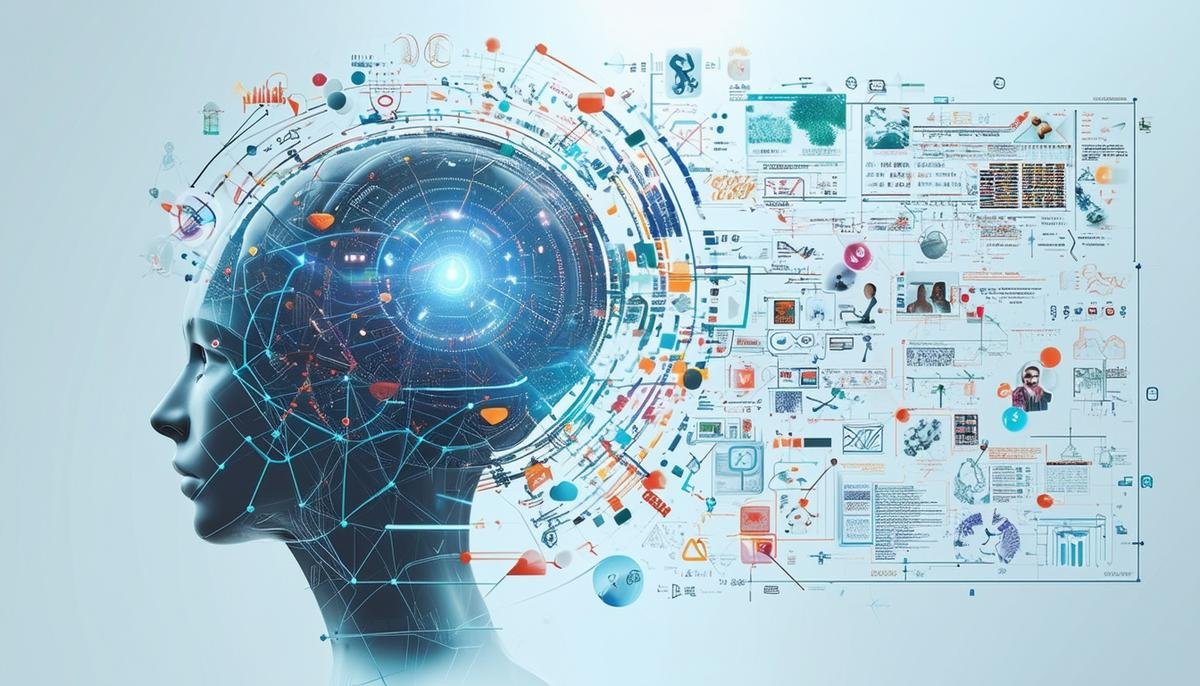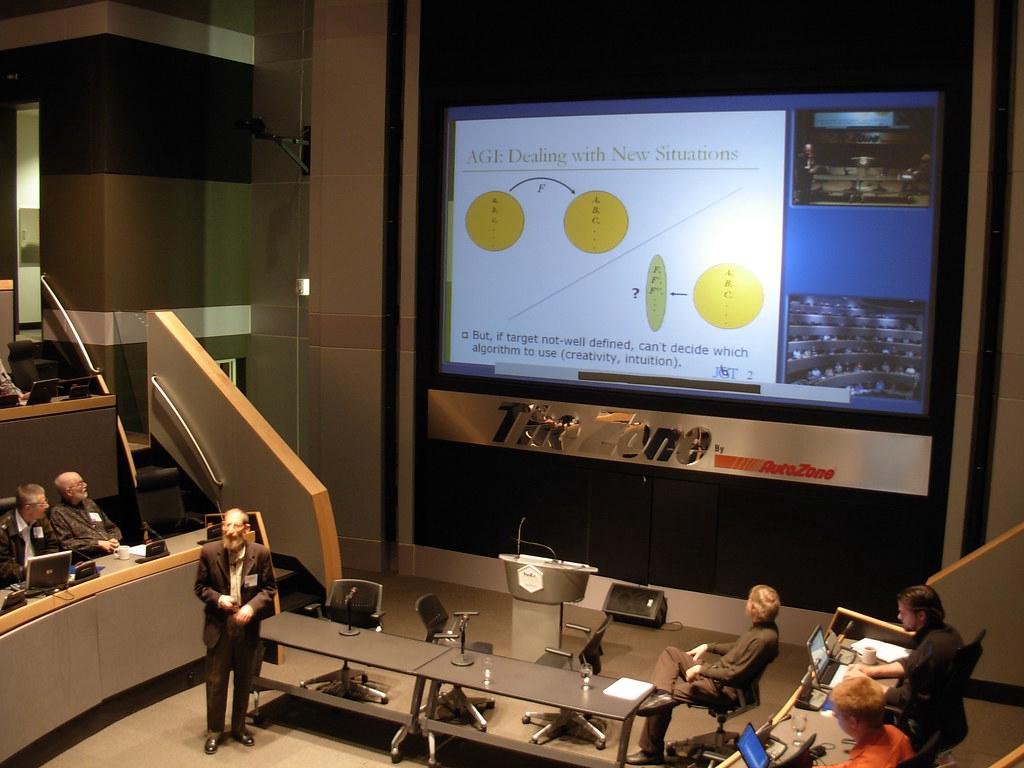Understanding AGI and Its Potential
Artificial General Intelligence (AGI) extends beyond typical narrow AI, aiming to replicate human-like cognition encompassing perception, natural language understanding, learning, reasoning, and problem-solving. AGI continuously learns and adapts, transferring knowledge across domains to tackle new problems.
While narrow AI achieves milestones like speech recognition, AGI integrates these capabilities. It could apply disease diagnosis methods to optimize logistics. This cross-pollination could drive discoveries across sectors.
AGI could accelerate drug discovery by learning from biochemical data and proposing therapeutic pathways. In physics, AGI could contribute to understanding the universe, managing complex experiments and hypothesizing and testing theories rapidly, furthering cosmic knowledge.
As AGI evolves, it introduces a new era in scientific research, rethinking problem-solving strategies. These systems can predict outcomes, optimize experimental designs, and minimize trial-and-error, leading to insightful conclusions.
Developing ethical guidelines and frameworks is crucial to prevent misuse and protect human interests. AGI represents an innovative leap and significant challenge, promising to unlock unprecedented insights into our world and beyond.

Current State and Challenges of AGI
AGI remains more aspiration than reality, but remarkable progress has been made. Current research focuses on advancing machine learning techniques, enhancing neural networks, and exploring cognitive architectures mimicking human thought processes.
Notable advancements include:
- Deep learning
- Reinforcement learning
- Progress in transfer learning—applying knowledge from one domain to unrelated domains
Technical obstacles impede fully functional AGI, such as:
- The vast data and computational power required for training models
- Acquiring adequate, high-quality datasets
- Ensuring AI systems do not perpetuate societal biases or unfairly impact specific groups
Philosophical questions arise about what constitutes true general intelligence and whether machines can exhibit creativity, empathy, or consciousness. Establishing control mechanisms ensures AGI remains aligned with human values and goals.
While promising advancements pave the way, AGI faces complex technical, ethical, and philosophical challenges. Concerted efforts across disciplines are needed to navigate these obstacles.

AGI in Accelerating Scientific Discovery
AGI’s advanced algorithms can process and interpret massive datasets at unprecedented speeds, unlike traditional methods requiring manual oversight. In genomics, AGI systems can sift through DNA sequences to identify disease-associated genetic markers, enabling researchers to pinpoint potential treatment targets efficiently.
Predictive modeling is another area where AGI excels. By continuously learning and adapting from datasets, AGI can create highly accurate predictive models foretelling outcomes across fields. In environmental science, AGI can model climate change impacts, predict weather events, and propose mitigation strategies with far greater precision.
Simulation and experimentation are supercharged by AGI. Creating virtual environments, AGI can test hypotheses and explore scenarios impractical or impossible in the physical world. In drug discovery, AGI can simulate biological interactions at molecular levels, vastly speeding up identifying effective drug candidates while minimizing initial physical trials.
AGI’s integration into scientific research heralds a new era of discovery by enhancing data analysis, refining predictive modeling, and enabling sophisticated simulation. Its potential is transformative, promising to turn possibilities into reality across disciplines.

Case Studies of AGI in Research
One notable case study is Purdue University’s AI platform, SCINET (Scientific Communication Interaction NETwork). This platform acts like a “ChatGPT for the lab,” allowing researchers to chat in natural language to design experiments. The system orchestrates instrument and analytical tool usage, creating a streamlined workflow. Tasks that once took weeks can now be completed in days.
SCINET exemplifies how AGI can bridge human inquiry and machine execution, enabling researchers to focus more on hypothesis generation than routine data processing. The ability to operate continuously and learn with each query means it evolves into a research partner, reducing the learning curve for new students and bolstering innovation capacity.
Another compelling case study is Microsoft’s Premonition project, an advanced biosecurity platform. Premonition uses AI, robotics, and cloud computing to detect and analyze biological threats earlier than traditional methods. Equipped with robotic “biological weather stations” and AI-driven analytical capabilities, Premonition can identify anomalies in environmental DNA, providing early warnings about potential public health threats, invasive species, or bioterrorism.
These case studies highlight how AGI facilitates a proactive approach in scientific research by identifying patterns and predicting potential threats, speeding up the discovery process while enhancing accuracy and reliability. The implications for healthcare are vast. AGI platforms could fundamentally change how we manage pandemics, develop treatments, and understand epidemiological trends.
These examples illuminate the broader trend of AGI enabling new scientific methodologies. Whether orchestrating complex lab workflows or creating comprehensive early warning systems, AGI proves invaluable in accelerating scientific discovery. The results highlight how integrating AGI into research enhances not only the speed and scope of inquiry but also ensures more accurate, reliable, and actionable outcomes, setting a new benchmark for innovation and efficiency in science.

Ethical Considerations and Future Prospects
Ethical considerations play a vital role in shaping the impact of AGI on scientific research. As we approach realizing AGI’s potential, the ethical landscape requires careful attention, with concerns about bias, transparency, and accountability being central.
Bias remains a significant challenge in AGI’s deployment. Even advanced systems can reflect biases inherent in their training data. An AGI drawing on biased historical datasets could perpetuate skewed outcomes, affecting areas from medical treatments to climate modeling. Ensuring fairness mandates proactive measures in data collection and algorithm design. Researchers must implement rigorous data diversity and inclusivity standards to mitigate these biases, not only improving data quality but also incorporating ethical AI frameworks that actively seek to reduce bias during training and operation.
Transparency in AGI decision-making is another cornerstone of ethical considerations. The complexity of AI models often obscures the decision processes, making it difficult to understand how conclusions are drawn. Transparency demands creating interpretable models, ensuring stakeholders can trace back the decision-making process. This builds trust and allows verification and validation of AGI systems in critical applications, such as healthcare and biosecurity. By making the decision paths clear, we can better assess the reliability and accuracy of the AI’s predictions and actions.
Accountability is pivotal when integrating AGI into scientific research. Determining responsible entities for AGI actions poses a legal and ethical dilemma. Establishing governance frameworks and regulatory oversight ensures AGI applications act in alignment with ethical norms and legal standards. Clear guidelines on the ethical use of AGI, alongside mechanisms for accountability, will be essential.
The roadmap for AGI is filled with exciting prospects and potential breakthroughs. One immediate prospect is the enhancement of personalized medicine, where tailored healthcare solutions based on individual genetic makeup and lifestyle factors become the norm. AGI systems generating personalized health profiles that predict potential health issues and recommend preventive measures could revolutionize how we approach health and wellness.
In climate science, AGI promises more accurate climate modeling and efficient resource management. By interpreting vast environmental data, AGI can provide precise predictions on climate change impacts and effective mitigation strategies. This capability becomes crucial as we face global challenges like rising sea levels and extreme weather events, guiding policy decisions and promoting sustainable practices.
Looking further ahead, the potential lies in achieving fully autonomous scientific research. This vision encompasses AGI systems formulating hypotheses, designing and conducting experiments, and iteratively refining knowledge without human intervention. Fully autonomous labs could drive continuous scientific discovery, potentially solving complex problems across various fields. The journey involves overcoming technical hurdles such as achieving sophisticated transfer learning and developing advanced cognitive architectures that mimic human reasoning.
Autonomous AGI-driven research labs could transform scientific landscapes, performing data analysis, predictive modeling, and replicating serendipitous discoveries. Creating AGI systems that can recognize and capitalize on anomalies during research will be paramount in achieving this vision.
While significant progress is being made toward AGI, ethical considerations will be fundamental in determining its trajectory. Addressing bias, ensuring transparency, and establishing accountability are non-negotiable aspects. The future prospects are boundless, holding promise for groundbreaking advancements across scientific domains. As we venture further, the roadmap to AGI’s full realization will require concerted effort, cross-disciplinary collaboration, and unwavering commitment to ethical principles.





